|
Possibly most importantly, spending four years on an FRC team helped me to realize what it means to have passion. So many adults have an easy answer for confused high-school students struggling to decide their futures: “follow your passion!” To me, this phrase was always counterproductive, almost cripplingly so; it assumes that you know what your passion is, which is the core of most students’ problems to begin with. Elizabeth Gilbert (author of Eat, Pray, Love and expert on difficult things) says it better than I can: “We are constantly being told to pursue our passions in life, but there are times when passion is a TALL ORDER, and...can feel completely inaccessible and impossible.” Now, examining my FIRST journey from the other side, I’m discovering that I identify with the word “passionate,” and I think I owe it to my frustrated sophomore self (and anyone else struggling to define their passion) to describe how I got to this point. Passion is what make you feel capable. Passion is exhilaration; it’s doing something and feeling the essential joy of knowing you have the ability to make a measurable difference. Passion is hope. Passion is what I felt after every interaction with a parent or a professional at an outreach event. Seeing the eagerness of a dad, arms full of NXT catalogs and FLL brochures, to go home and tell his daughter about the Lego robotics program for young students gave me the sense that the work I was doing, no matter how personal in scale, was important. Watching the eyes of education superintendents widen in surprise when they learned that an FRC bot is built in only 6 weeks made me giddy. Inspiring people to pursue STEM education is my passion, and I had to do it for a few years before I realized it’s what I love. That being said, passion is still an intimidating thing. For this, I go back to Elizabeth Gilbert: “Passion is a tower of flame, but curiosity is a tiny tap on the shoulder — a little whisper in the ear that says, ‘Hey, that's kind of interesting…’ Passion is rare; curiosity is everyday...
The trick is to just follow your small moments of curiosity.” (Read her full article here.) I agree with Elizabeth Gilbert, but at the same time, it’s the tower-of-flame nature of passion that makes it worth pursuing. If I’ve learned anything about passion, however, it’s this: that passion isn’t something you chase down. That real passion is the thing that comes to you in the midst of your curiosity-pursuing, whispering “Hey, I was here the whole time.” That when it finds you, you’ll know it. Now, as a FIRST alumnus and barely-started college student (the west coast starts school ridiculously late in the year!), I’m far from done with my journey of discovering passion. If there’s one thing I’ve learned from the many college advice panels I’ve listened to and articles I’ve read, it’s that college is a time to try new things, to “follow your small moments of curiosity.” There’s a certain joy to being able to pursue things just because they’ve captured your interest, whether it’s an introsem on digital literature or a no-experience-needed student club for competitive ballroom dancing or a campus organization for unicycle basketball (yes, it’s a thing). I’m thrilled to have the next four years to pursue my curiosities and wander into new passions, and I’m beyond grateful for the FIRST robotics program and my team for giving me the confidence to tackle the unknown and revel in challenges. FIRST robotics taught me how to grow, and that is something I’ll never stop needing. A big THANK YOU to FIRST Ladies for providing this amazing platform and community for FIRST-lady-driven content and especially to Rachel Hunter for letting me drag this out over 3 weeks. :) If you have questions or just want to talk about college (applications, decisions, post-high-school life), being a lady in FIRST, the FRC experience, or being a young human during a confusing time of big decisions, feel free to talk to me! [email protected] Be my friend on Facebook Connect w/ me on LinkedIn Read my thoughts on Medium Stephanie Niu is a recently-graduated alumnus of Walton Robotics, FRC team 2974. She currently attends Stanford University as a computer science major. If you are interested in blogging for FIRST Ladies, click here to sign up on the schedule.
2 Comments
Life after FIRST: What 4 Years in FIRST Taught Me About Confidence, Leadership, and Finding Passion Part 2: Being a (Female) Leader in STEM Teaching students to be leaders is the most significant thing that FIRST does. In learning to be a leader on my team, I realized the strength and capability of a well-led group with a goal. I learned the necessity of integrity and the essential selflessness that holds a team together. Together, my team brainstormed, set big goals, and carried those goals to a completion that often astounded us with its swiftness and depth. In the summer of 2014, our team created a new department that we summed up with the ambiguous heading “international relations.” The main goal for the department (which quickly became my department when leadership roles were assigned) was to carry out a STEM mission-- aka, carry out significant STEM outreach in an underprivileged, under-reached part of the world. We wanted to travel internationally within the next five years. Exactly one summer later, nine students from Walton Robotics boarded a plane to Sao Paulo, en route to an underserved community in Pindamonhangaba, Brazil. Just one year after setting our five-year goal, we delivered a 5-day free STEM camp for 37 under-privileged children in Brazil. We had nurtured our idea, designed a challenging but sustainable STEM curriculum for young students, tested the camp projects ourselves, and formed a powerful partnership with one of our sponsors, Novelis, to help us navigate Brazil and fund the trip. Leading the Brazil initiative (with my partner-in-crime: s/o @ Jennifer Benton) taught me that leadership is so much more about the process than the product. I know, it’s cheesy, but the process of planning and delivering a STEM camp on a different country in a foreign language taught me that leadership is a lot of small successes that are independent of what happens in the end. Being a leader is reminding teammates that their work has value even if the sixth attempt at building a potato clock fails. It’s pushing the quiet kid to present for the group, listening to the way someone wants to teach their project even if it’s not your way, and being able to let go when a pet project fails enough times (in my case, the pet project was a deceptively simple-seeming bottle rocket, and “enough” was after the 20th-or-so tragic attempt). It’s knowing when to remind everyone to stay on track and when to celebrate. Leadership is so much more about the people than what you end up accomplishing; your work is to help each team member become their best self, and it’s that much better if you end up teaching Brazilian kids how to build rockets in the process. As a female going into a STEM field (I’m planning on majoring in computer science at Stanford), being a leader through my team was especially valuable for me. FIRST empowers students, especially females, to embrace their roles as leaders and become role models for younger students. My team created a program called GirlsFIRST- in essence, a series of events including robot scrimmages on a full field, discussions, and panels with women in STEM careers, all led, run, and attended by girls in FIRST. GirlsFIRST provided the unique opportunity for us to chat with young women on other FRC teams in a setting where we could directly address the gender imbalance in STEM fields and talk about if/how it shaped their FIRST experience. The next GirlsFIRST event is actually planned for this October, and you can sign your team up here. I learned a lot from these girls and from my time as programmer and leader on our team. Many important things have already been said about the state of women in STEM fields (like in articles like this or this or this), so I’ll highlight things I learned in my experience.
There’s a lot to be done when it comes to balancing the gender ratio in STEM. But FIRST is providing a way to build communities of people driven to change the culture for women in tech and inspiring young women to become leaders in what they love, whether it’s in STEM or not, and that’s pretty awesome. Stephanie Niu is a recently-graduated alumnus of Walton Robotics, FRC team 2974. She currently attends Stanford University as a computer science major. If you are interested in blogging for FIRST Ladies, click here to sign up on the schedule.
Four years ago, when my mother asked if I wanted to join the school robotics team, I said “Sure, why not.” I was fourteen years old, terrified of speaking in public, and unable to tell the difference between a drill press and a band saw. Fast forward to February of 2015: I’m holding a microphone in front of 500 people, ready to welcome them and run one of the largest pre-season scrimmages in the southeast. Fast forward again to July 2015: I’m in Brazil, waving goodbye to 37 local children who I’ve taught and learned to love over the past 5 days, unable to believe my journey as a FIRST student is coming to a close. Summarizing what I’ve learned from my years in FIRST is difficult because of the depth and magnitude of the program’s effect. FIRST and my team, Walton Robotics, didn’t just teach me personal and professional skills that enriched my resume; they changed who I am. How do you measure something that has altered the way you see yourself and the world, guided you to pursue a career, and helped you to see what it means to have passion? The first of many things that my team gave me is confidence. Growth through challenges is the nature of FIRST, and my team embraces that by constantly pushing its students out of their comfort zone. Granted, my comfort zone as an intimidated, mostly inaudible freshman was pretty small. I struggled with even answering questions in class because sometimes just having to speak in front of a room full of my classmates could cause my eyes to well up. It was bad. I was a member of the Chairman’s presentation team my first year, and I quickly learned that you can only give a presentation a certain number of times before the words naturally stop choking each other on the way out. The idea of delivering a high-stakes presentation in front of solicitous judges was scary initially, like most things in FIRST, but actually doing it made me much more confident in my speaking abilities. One of my most vivid memories of my time on the team is from a Chairman’s practice about a month before competition my freshman year. We had a speaking coach from Toastmasters come in and critique our presentation skills, and boy did he have a lot to say about me. I wasn’t kidding about being inaudible; the Toastmasters guy said he could hardly hear me, and he and my mentors spent a few minutes encouraging me to “Yell, Stephanie, yell!” By the end of the practice I was screaming (or what I considered screaming) my slides at the audience, feeling giddy as I giggled at myself. I never thought in my life I’d consider public speaking one of my strengths, but a lot can change in four years. I’ve realized that public speaking is an opportunity, not a crutch; although my hearts still beats like mad before any presentation, I’ve learned to enjoy getting up in front of an audience. Speaking publicly is an opportunity to share your passion, and seeing it that way has changed the way I deliver my ideas. Now I jump at opportunities to speak on panels, give presentations, or represent the team in front of crowds (and sometimes rolling cameras). I’ve been interviewed by Georgia Public Broadcasting (twice), CBS Atlanta, and BusinessRadioX about FIRST and my team, and I’ve thoroughly enjoyed each opportunity to share my excitement with the world. Spending a lot of time outside of my comfort zone helped me realize how thrilling it is to be outside the bubble of safety- to stand up in front of 500 people, with or without a plan, and trust that you’ll be able to welcome and lead them through a full-scale scrimmage. To embrace the vulnerability of writing openly and sharing that writing with the world, to take opportunities because they scare you. I’ve realized that the ability to take risks is like a muscle; you can make it stronger by practicing often on small things and push yourself out of the your comfort zone more easily when important opportunities come up. Ask that question even if a lot of people are watching. Start a conversation with a stranger on the subway. Introduce yourself to the person who’s higher up on the company ladder than you are. Being uncomfortable is a thrilling generator of confidence that everyone deserves to experience, and I’m grateful for the opportunities my team and FIRST gave me to do so.
Stephanie Niu is a recently-graduated alumnus of Walton Robotics, FRC team 2974. She currently attends Stanford University as a computer science major. If you are interested in blogging for FIRST Ladies, click here to sign up on the schedule. Coraline Ada Ehmke is a developer, diversity activist, and transgender feminist. She’s passionate about open-source projects (especially those involving Ruby), increasing diversity and inclusivity within the tech community, and the sharing of ideas through public speaking and presentations at conferences. Among her many projects that are making the internet a better place is a website called Open Source for Women, a resource/community for women who are involved or interested in contributing to open source projects. More information about her can be found at where.coraline.codes.
I was excited to be able to ask Coraline some questions about her work and get her advice on being female in tech and how we as a community (FIRST Ladies and FIRST as a whole) can be more welcoming, sensitive, and inclusive. Q. You have a lot of projects going on right now - out of everything you’re working on, what are you most proud of and why? A. The Contributor Covenant is my favorite project right now. It's a code of conduct for open source projects. A lot of underrepresented and marginalized people are turned away from contributing to open source software, often because of sexist, racist, or ableist language, or because projects are not friendly to new developers. The Contributor Covenant tries to address that problem by turning open source communities into safe spaces where everyone is welcome to contribute and participate. It's been adopted by a number of high-profile projects, and the list grows every day. I'm very encouraged by this and I hope it leads to a solution to the problem that our community can have with inclusion and diversity. Q. As a developer, your job is to solve problems, which (as the programmers within FIRST ladies know), can often be frustrating. How do you stay motivated when you're blocked or struggling to figure out a problem? A. I try to remember that when I'm struggling, that's when I'm also learning. And learning is my favorite thing about my work. It would be really boring if I immediately knew the answer to every problem that came my way. So I like to remind myself of that, especially when I'm frustrated. Q. FIRST involves more than just robots - teams have to learn lots of skills, including presenting their projects to judges and public audiences. As a successful public speaker, do you have any tips for teams about how to present engagingly and effectively? A. I think that the secret to a great presentation is sincerity. You put something of yourself in your project, and you need to share that spark. If you don't care about the results you achieved, it will show when you talk to someone about it. We get excited by other people's passion, and making sure that passion comes through is the most important thing. More important than anything you can say is the look on your face when you're saying it. It's also a good idea to spend some time thinking about the story you want to share through your presentation. And note that I said story, not information. People love a narrative, and the best talks in my opinion are those that tell a compelling story. Q. How have your unique experiences as a transgender woman within the tech community influenced your views on the culture surrounding STEM? A. Having spent the first half of my career with male privilege, I have what I consider to be a unique perspective on issues of diversity and inclusivity in STEM. I've been on both sides of the issue. And really, it wasn't until I gave up my male privilege when I transitioned that I saw first-hand how tough things can be for women and other underrepresented people. I knew that there was a problem at an intellectual level, but experiencing it for myself was shocking. That's what inspires my outreach work; I want to use my experiences to make things better for other people who may be struggling. Q. Being an active and visible internet presence can inspire and encourage people who follow you, but unfortunately often comes with uninvited comments and straight-up hate. How do you deal with criticism and insensitivity regarding your code, your work, and you personally? A. There are a lot of really hateful and ignorant people in the world, and it takes real effort to keep their voices from drowning out the positive things in my life. My support community is essential to my mental well-being. I have people that I can rely on, that I can share my experiences with; people who have been there, too. I think having a network of people who love you and care about you is the most important thing. It's dangerous to go alone! I also have a little trick that I use to cheer myself up when things do get me down. I take screenshots of nice things that people have said about me, and I keep them in a folder on my desktop called Kindnesses. When I'm not feeling good about myself I can browse the pictures in that folder and relive the moments that have made me smile, made me feel appreciated. That helps a lot. Q. What advice would you give to girls, specifically trans girls, who are interested in coding or other tech-related jobs? A. When I started my transition, I used the fact that I was changing everything about my life to push me to examine who I really wanted to be, and to move myself closer to that ideal person. Empathy is something that I learned through this process of reinventing myself. And empathy is critical to success in the tech field. No matter what technology you're working with, almost any technical problem comes down to a people problem. If you're going to succeed, you have to be good at recognizing and solving them at this level. That means using empathy to understand where someone is coming from, or how your users will feel. Clear communication with the people in charge of projects, and especially your coworkers. The ability to express yourself clearly and confidently. All of these skills-- too easily dismissed as 'soft skills'-- are the most crucial to my success as a developer. Q. What are some things the FIRST community can do to encourage diversity and promote trans inclusivity? A. Be clear and direct about the space you're trying to create with your community. Express your values and follow through on them. Use inclusive language and make sure that you're making people who don't look like you feel welcome there. But most importantly, make sure that your leadership reflects the diversity that you're trying to create in your participants. It's important that everyone in the group have a role model, someone like them that they can look up to and be inspired by. Diversity is simultaneously top-down and bottom-up. Q. Is there anything else you would like the ladies of FIRST to know (about you, being a successful woman in tech, etc)? A. Learn how to learn, and fall in love with the cycle of struggle and growth. This skill will take you wherever you want to go. If you want to learn more about Coraline, you can find her on Twitter (@CoralineAda). This blog was written by Annika Garbers, FTC 5975 Alum & current college freshman at RIT. If you are interested in blogging for FIRST Ladies, click here to sign up on the schedule. |
Be a guest
Do you want to be a guest blogger for FIRST Ladies? You can write about a topic of your choice! Anyone can submit a blog, especially our Regional Partner teams! Please email us the a Google Doc of the completed blog. Thank you! Archives
April 2024
|
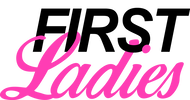
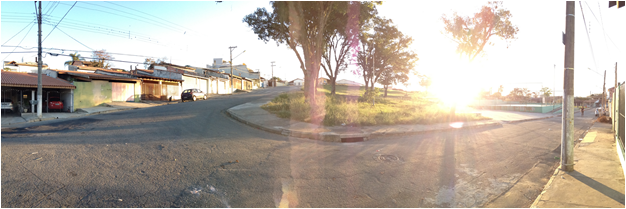
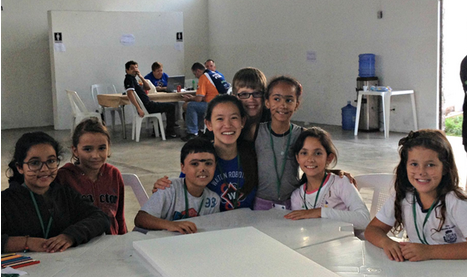
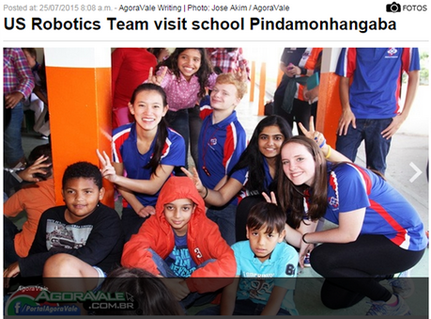
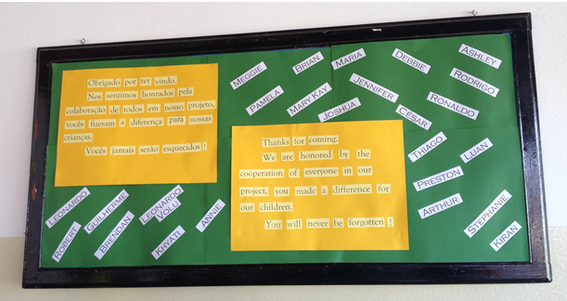
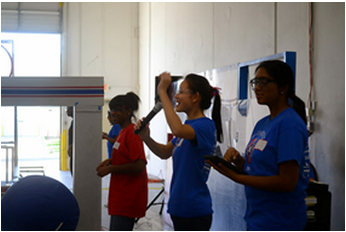
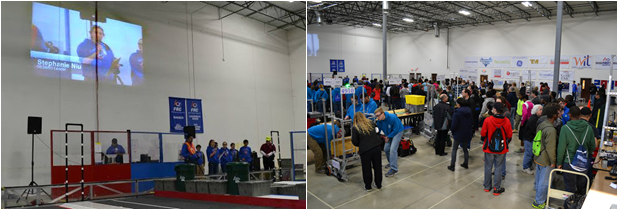
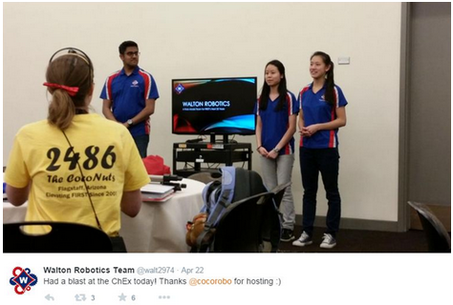
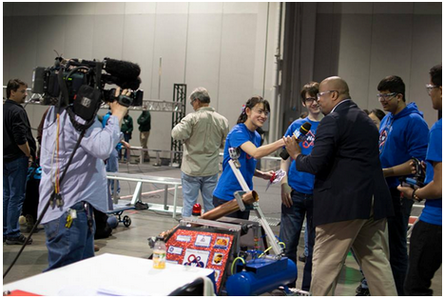
 RSS Feed
RSS Feed
